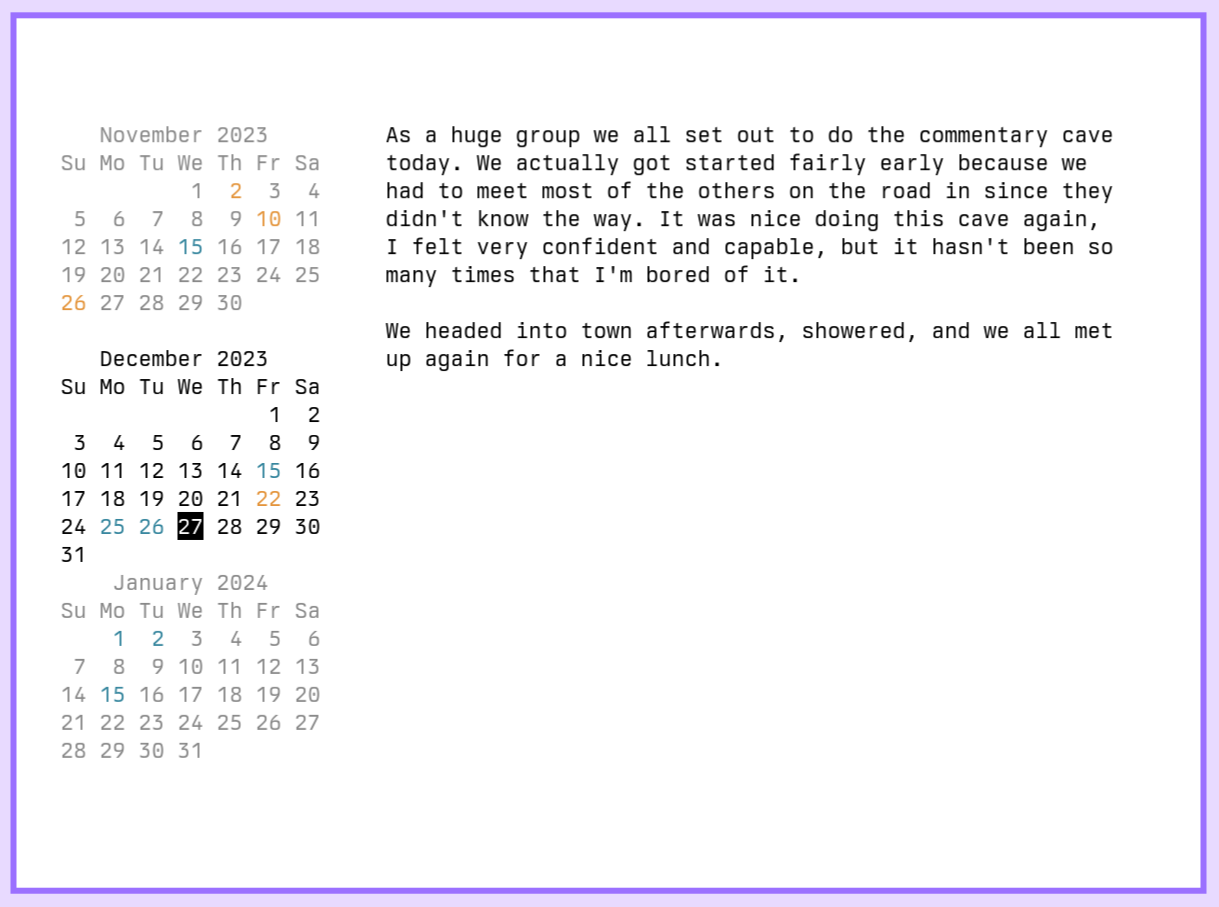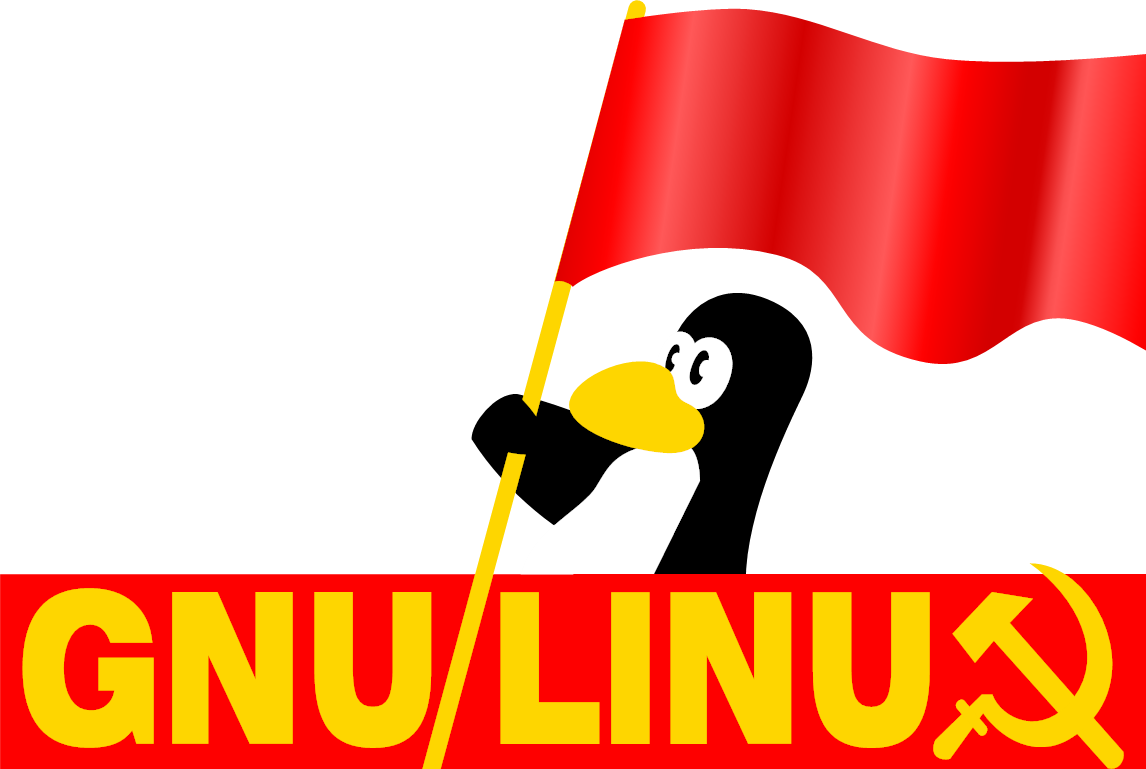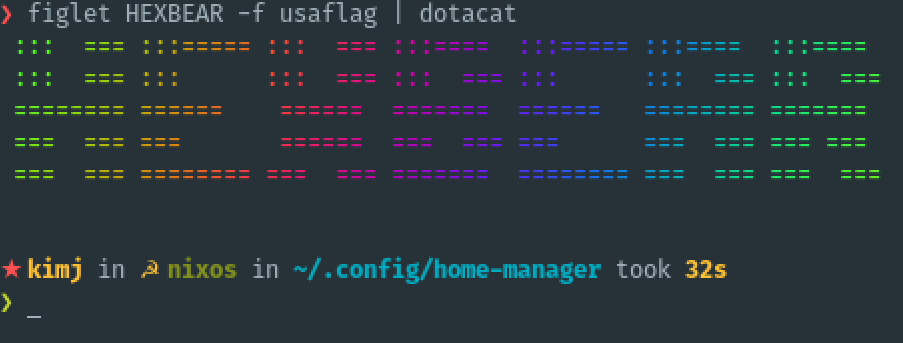the most essential programs are, of course, neofetch, pfetch, fastfetch, macchina, ufetch, and screenfetch.
This is pfetch-with-kitties erasure.
 how could I forget the best one?
how could I forget the best one?
currently using freshfetch, because it's written in rust and that's good for reasons i don't currently understand.
It makes it blazingly fast!
For a filemanager try out nnn it takes a bit of getting used to but it's very elegant and has a lot of clever little quality of life features. I use pulsemixer for volume and ncmpcpp + mpd for music. I like this cli calculator. It works basically as you'd expect and you can use . to mean "result of last calculation".
I guess I'll also plug my calendar program lol: 
I wrote this calendar over the last few years. Pressing enter on a day allows you to write a note/journal entry for that day, which can be previewed quickly in the calendar. You can also add keywords like "appointment" which, if they exist in a note, will change the color used to display that day: 
I've added various other features over the years like a help menu (press ?) and mouse support. There's only a few minor things left I have planned so it's mostly a "finished" project which is nice.
NNN seems to work pretty well.
That calender app looks really nice! I was looking for something like that.
ripgrep is an excellent grep replacement to check out. wild how much faster it runs. +1 on the eza (other poster said exa but that's abandonware forked to eza)
check out deploy-rs and ragenix once you've replaced your current media server with a NixOS one. They make it much easier to apply configuration changes and to handle secrets if you need em for configs. +1 on start using flakes ASAP if you're not already (pretty sure both these tools only work with flakes), Xe Iaso's got a bunch of good blog posts about em if those are your jam.
I am currently playing around with it in a vm until the config is to my liking.
this is how I got NixOS to click for me, 10/10 highly recommend. even if it doesn't stick this time keep your config in source control somewhere so you can revisit it.
Any reason to use an alternative to bash?
gonna strongly disagree with one of the other posters in here that you should use POSIX-compliant shells because they're more portable, for a few reasons:
- if you're using the shell on a server or someone else's workstation to do more than run a handful of diagnostic binaries you're already wasting your time, and even then finding a quick one-liner in stack overflow to do some annoying repetitive task like filesystem cleanup or the like will be trivial. goes double for nixos where the likelihood you're doing anything once shelled in besides editing a config or running a diagnostic becomes even more unlikely
- speaking of, since you use nixos, you can trivially have your preferred shell environment available on any server you're running for yourself
- modern structured data pipeline-based shells (PowerShell, elvish, nushell, etc.) are far more ergonomic for both interactive and scripted usage
I wrote a little bit more about how modern structured data shells have been a more ergonomic option for like two decades now in a dunk tank post a few weeks back so I'll just link that instead of elaborating.
even if you find you prefer flat text pipelines, zsh and fish are fine (and were preferable for me for interactive use before I started using pwsh and then elvish) and you'll still wind up writing bash scripts anyway. or at least when I used those shells I don't think I once wrote a script that targeted them instead of bash. also #! /usr/bin/env sh is fine, you should hopefully be well aware when you write scripts that have a chance of running on a system that has a weird shell symlinked to sh.
Thanks for the flake tutorial. I've implemented one already, but was a little confused about it. I plan to come back to it eventually.
I was planning to stick to bash, but since with nix you can switch between a few different shells trivially, I might as well look into the alternativces more closely.
I work outta zsh as it's the default for macOS but I can't evangelize it much because I don't have enough bash experience to differentiate the two. I think it's pretty neat, though.
I use passion for my theme and spaceship for my prompt. Used to use powerlevel, but I found it to be too visually cluttered for my tastes after a while. With opsec stuff cleared out–here's my neofetch:

and here's an example prompt:

some useful aliases:
alias modx="chmod +x" # make file/script executable
alias calc="bc -e" # quick calculator
alias sl="ln -s" # symlink
I'd also recommend making a catch-all function for updating your package managers. I call mine shell-update and have it aliased to shu, which is the following function in my config:
brew update # homebrew sync
brew upgrade # update packages
brew cleanup # delete old versions
rustup update # rust toolchain update
npm update -g # node global update
pip3 list -o \ # python mass update
| cut -f1 -d' ' \
| tr " " "\n" \
| awk '{if(NR>=3)print}' \
| cut -d' ' -f1 \
| xargs -n1 pip3 install -U
omz update # oh-my-zsh update
Your environment may vary.
Cool, thanks!
A custom update function was something I was thinking of doing. The nix commands are a bit arcane, having a simple "update" command for all of them seems like it would be useful.
Ed is the standard text editor
Any reason to use an alternative to bash?
Some people will say that zsh is a better interactive shell than bash, but using a different interactive shell than the shell that runs your scripts makes it harder to write shell scripts. I've also heard that because zsh technically implements POSIX that you can simply target sh for your shell scripts, which is also not a good idea. There's too many variants of sh, and some variants like Dash do not support Bash features like [[ conditions, it's much more practical to target bash.
I'll keep that in mind. I'm probably going to go with the default bash unless there is a feature something else has that looks neat.
You can use fish or nushell if you really want to use something other than bash. Bash is useful because it's installed in virtually all GNU/Linux machines by default. So unless you live in your terminal prompt 24/7 you dont need to change.
Zellij over tmux.
Best text editor is the one you like using and receives constant updates (and libre).
Make sure you start learning Nix Flakes as soon as possible if you want the most out of NixOS. The documentation is quite verbose so that's what I'd prioritize.
Zellij looked like the way to go, so that seals it. Thanks.
and three strong recommendations to start using flakes, so I guess that's what I'll jump into next.
tldr pages for when you need a refresher for a command but don't feel like digging through a whole man page.
here's a cool guide on using flakes for your nixos setup. which you should probably do since they're likely going to replace the current system at some point
if you get stuck on something with nix search around github with the langauge:nix tag and you'll usually be able to figure things out based on what other people have done.
Thanks!
https://github.com/nvbn/thefuck I think this kne is a must
I've been thinking about getting into nix, any resource recommendations to get started?
These two channels were the main ones I referenced
https://www.youtube.com/@librephoenix https://librephoenix.com/tags/nix.html
https://www.youtube.com/@vimjoyer
Seeing what this Zaney guy did with his nix install is what got me intrigued.
Best way to go is to install it on a VM and start looking at the .nix files and following instructions on how to add programs, and then move on from there.
helix looks really cool. how is the plugjn ecosystem?
nonexistent, but they're working on it i guess. they have decided on Scheme as the language and ruled out suggestions to support multiple languages. so it's not looking great imo which is a shame since I liked it better than neovim. currently using it as a nano replacement on my nixos pi setup, but will probably ditch it at some point.
Sensible defaults and the lack of plugins seems to be why people like it.
I can’t speak for everyone but I don’t like the lack of plugins, though I do appreciate the reduced necessity of them.
Is there at least good LSP support?
It look like it does
decided on Scheme as the language
 SCHEME MENTIONED +++++++1 or (+ 1 1 1 1 1 1 1 1)
SCHEME MENTIONED +++++++1 or (+ 1 1 1 1 1 1 1 1)
gnu stow to stow all those dotfiles into a single folder. Track the folder with git, the persist it across multiple devices.
fzf or skim integrate nicely into all sorts of different things. Basically let's you slap a specific ui onto a script.
Ranger is the best style of terminal file manager and the only mature one. I tried joshuto and wanted to like it but it just wasnt as mature and ranger.
With ranger there's a --chose-dir option that you can use in a function so that you jump to the folder you left on when you exited ranger. Such a massive time saver from constant ls, cd and tabbing. Like there should be a lightweight version of the program that only does that and should be considered standard unix like vi. Actual file management is secondary.
stow pretty redundant with home-manager tbh, I don't think OP would find it that useful if they're already writing modules for their stuff
With ranger there's a --chose-dir option that you can use in a function so that you jump to the folder you left on when you exited ranger.
that seems incredibly useful, thanks!
cmatrix and cbonsai are classics off the dome. btop is the fanciest and prettiest top variant. exa is a more modern ls. pywal can also be very fun, it generates color schemes from your wallpapers. if you have a nvidia graphics card, something like nvtop can be useful.
pywal can also be very fun, it generates color schemes from your wallpapers
nice!
I was looking at zoxide the other day, haven't gotten around to trying it yet but it looks neat.
Tmux / GNU Screen. Both are terminal multiplexers which allow you to do things like split a terminal into several windows and detach your session (so for instance, you can detach from a text terminal and resume in a terminal emulator, or so you can re-attach to a remote session over SSH after a hangup).
libre
Welcome to libre
A comm dedicated to the fight for free software with an anti-capitalist perspective.
The struggle for libre computing cannot be disentangled from other forms of socialist reform. One must be willing to reject proprietary software as fiercely as they would reject capitalism. Luckily, we are not alone.

Resources
- Free Software, Free Society provides an excellent primer in the origins and theory around free software and the GNU Project, the pioneers of the Free Software Movement.
- Switch to GNU/Linux! If you're still using Windows in
$CURRENT_YEAR, take Linux Mint for a spin. If you're ready to take the plunge, flock to Fedora! If you're a computer hobbyist and love DIY, use Arch, NixOS or the many, many other offerings out there.
- Those on Apple Silicon Macs can consult Asahi Linux for available options.
Rules
- Be on topic: Posts should be about free software and other hacktivst struggles. Topics about general tech news should be in the technology comm or programming comm. That doesn't mean all posts have to be serious though, memes are welcome!
- Avoid using misleading terms/speading misinformation: Here's a great article about what those words are. In short, try to avoid parroting common Techbro lingo and topics.
- Avoid being confrontational: People are in different stages of liberating their computing, focus on informing rather than accusing. Debatebro nonsense is not tolerated.
- All site-wide rules still apply
Artwork
- Xenia was meant to be an alternative to Tux and was created (licensed under CC0) by Alan Mackey in 1996.
- Comm icon (of Xenia the Linux mascot) was originally created by @ioletsgo
- Comm banner is a close up of "Dorlotons Degooglisons" by David Revoy (CC-BY 4.0) for Framasoft
 ) as a replacement to my current windows install.
) as a replacement to my current windows install.